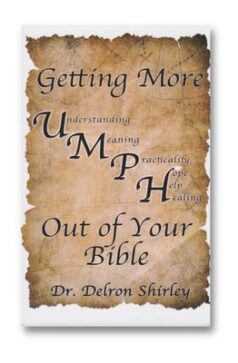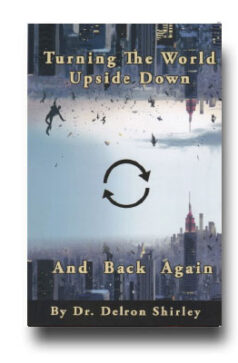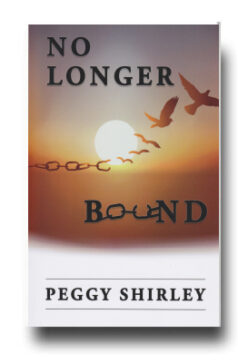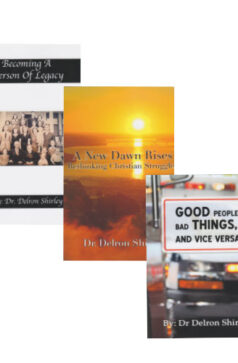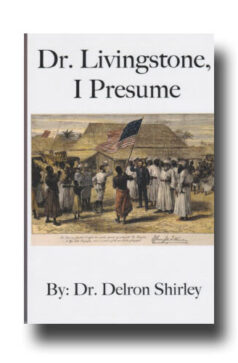Practicality! Now, that’s an interesting – even challenging – concept when thinking of the Bible. All too often, we respond in entirely impractical ways when we read the Bible. We see that we are supposed to love everyone – neighbors and enemies included – and become starry-eyed “flower children,” going around singing, “What the world needs now is love, sweet love. That’s the only thing that there’s just too little of…” Or we read that Jesus is coming back, and we become wild-eyed conspiracy theorists who see every Supreme Court decision and hurricane as proof that a “zombie apocalypse” is just around the corner.
Finding practicality in our study of the Bible comes through directional study of the Word and involves three aspects: learning to focus on the relevant details, becoming part of the story, and determining to be a doer rather than simply a hearer of the Word. (James 1:23-24)
We have all heard the saying, “the devil is in the details”; yet, it may be more accurate that it is the “big picture” where he is lurking and that it is actually God that we will find in the details. For example, the principle that we are to love our enemies is just too big to grasp, leading us to some very impractical conclusions, such as poking flowers into our hair and chanting mantras. However, if we look for a smaller, more attainable principle within the “big picture” – such as praying for them (Matthew 5:44) – we can actually find a practical and effective way to apply the scriptures to our lives. I personally witnessed this principle work and change an entire nation during my ministry in Nepal. For almost a quarter century, Maoist insurgents had flexed their muscles through violence and threats. They destroyed the infrastructure of the country, forcibly conscripted young men into their ranks, and wreaked general havoc and violence throughout the country. When the Christian leaders came to me, asking how they could handle the problem, I responded with the adage, “Hurt people hurt people” and added that the Maoists were hurting the nation because they were hurting because they had no voice in the government. I suggested that the believers begin to pray that something would happen to heal the Maoists’ hurts so that they would stop hurting everyone else. Miraculously, the government decided to enter negotiations with the Maoist leaders to end their hostilities and eventually granted them recognition as an approved political party, enabling them to hold elected political offices. In fact, I had a front-row seat to the negotiations because they were held in the same hotel where I was staying – just two doors from my room. I have always felt that this was God’s way of showing me that He was honoring my counsel that the believers take a practical approach to applying the Bible to their life situations.
Proverbs 22:6 tells us to train up a child in the way he should go; however, there is actually a deeper meaning in the Hebrew wording in that it more literally tells us to train a child according to the way he is destined to go – a message that is borne out in the International Standard Version which renders the verse, in the way that is appropriate to him, the Easy-to-Read Version which yields it, in a way that fits his needs, and the Darby Translation, which words it as, according to the tenor of his way. If God understands that human parents must alter our training and disciple approaches for each child according to his or her personality, certainly, He – as our heavenly Father – practices varied approaches for His children. This leads us to the second aspect of the directional approach to find practicality in our study of the Bible – becoming part of the story. In this step, we give the Holy Spirit an opportunity to work through our individual personalities to convey personal revelation to us. With my background as a chemist, I must see how things work logically. One close friend has a background as an attorney; therefore, he sees every detail in Scripture as a legally binding contract that must be fulfilled “to the T.” Other friends of mine with more artistic personalities see drama and beauty that chemists and lawyers might overlook. When we allow our God-given individuality to express itself, we will find that the Bible becomes very practical in our individual lives.
Once a gentleman challenged me, saying that the Word of God did not speak to him about his decision to buy a new car. I began by jokingly suggesting that it was God’s will for him to own a Triumph because II Corinthians 2:14 says that God always causes us to have triumph; or that it would be acceptable for him to own a Honda because the apostles had their Accord with them on the Day of Pentecost (Acts 1:14). On a more serious note, I began to turn to scriptures, basing my response to him on what I knew of his personality – that he was a generous giver (Romans 8:12) – and began to examine passages about money. When we had established that buying this new car would not interfere with his financial obligations to God in tithes, offerings, and alms, then we turned to other scriptures about letting material things come before God. Having settled those issues, I gave him several verses in which the Lord assured us that He wanted His children to be blessed and told him that it was obviously God’s will for him to be blessed with the new car that he was desiring in his heart. I then reminded him that God wants us blessed in our coming in and going out and in the city and in the country. I couldn’t pass up the opportunity to add that he would be blessed more by driving than walking as he was coming and going in the city and in the country. Finally, my friend looked up and said, “Yes, the Bible does say a lot about my decision to buy a new car!” The scriptures had laid out a general pattern of life, and as he moved into that general flow, he could see his specific path emerging.
The third aspect of directional study of the Word is the intent to actually follow what it says and put its principles into practice in our lives. In Deuteronomy 28:1, the Lord promised that He would set us on high above all nations of the earth if we would hearken diligently to His voice and observe and do all His commandments. He promised Joshua prosperity and success if he would constantly meditate on the Word of God and observe to do everything that is written in it. (Joshua 1:8) One of the last aspects of the Great Commission is that we are to teach the nations of the world to observe everything that the Lord has commanded. (Matthew 28:20) Therefore, I suggest that we conclude every Bible study by reminding ourselves of the words of the Apostle Paul in II Timothy 3:16-17, All scripture is given by inspiration of God, and is profitable for doctrine, for reproof, for correction, for instruction in righteousness: That the man of God may be perfect, throughly furnished unto all good works. There are three aspects to applying the scripture to our lives so that they become profitable or practical to us. Reproof literally means to cross-examine as does a trial attorney. The power of having our lives cross-examined through the Word of God is that we are always assured that we are seeing all the issues from God’s eternal perspective rather than only through our limited viewpoint. Correction is different from punishment. It is not having to face the consequences for wrong actions; rather, it is giving God the opportunity to fix things at the source from which they originated. Instruction in righteousness is allowing the Holy Spirit to help us develop a plan for moving forward, freed from these faults and enabled not to repeat them. I love to refer to this aspect of directional study as “tangible accountability.” Too often we want to default to the “big picture” of “I’m going to ask God to make me a better person.” However, such nebulous ideology will not result in any changes in our lives. I always insist that those whom I am discipling give me a practical explanation of how they are going to ensure that their lives change so that they actually do become the better people that God wants them to become. For example, one individual was having a real problem with looking at pornography on his computer. When he decided to install a program that mirrored every website he visited on a friend’s computer, he was instantly freed from that addiction. Another student realized that he did not have the lifestyle of thankfulness that the Lord desired for him. He told me that he was going to program his cell phone to send him random messages three times each day reminding him to be thankful. When he got a beep during a boring business meeting the following day and thought, “Thank God this meeting will be over in just a few minutes,” he realized that his tangible accountability was already working. And then there was the young girl who wanted to have a more prayerful life. She determined that she would pause for a quick prayer every time she had to readjust her necklace because the clasp had slipped to the front rather than the back of her neck. She was surprised at how many windows for prayer this practice gave her each day.
One of the most fulfilling experiences concerning directional Bible study began with a “bad hair day” that made my wife and me late for church one Sunday morning. As we slipped into the sanctuary a bit tardy, our regular seats four rows in front of the sound booth in section one were already taken; so we wound up finding a spot in the back of the auditorium. A little later, two more latecomers took the empty seats on the row in front of us. These stragglers were Dick Eastman, the President of Every Home for Christ, and his wife Dee. Later in the service we had a chance to meet them, and we eventually asked them to join us for lunch. They graciously accepted our invitation and met us at a nearby restaurant where we shared about our connection with Every Home for Christ in Nepal. When Dick asked about our ministry, we told him about our call to go to developing nations and train the Christian leaders. Immediately, he took his electronic organizer out of his pocket and typed in my phone number and email address. Within a couple days, one of his top staff members contacted me and asked to set up a meeting. That meeting led to the request that I assist Every Home for Christ in a project that they were just initiating — a program for training Christian leaders in developing nations! We were late for church and not in our right seats, but we were in the right place at the right time to meet the right man just when he needed our help!
The outcome of this divine appointment was that I became part of an international team to develop and launch a new discipleship curriculum. The team spent almost a year analyzing every available discipleship program from the Apostles’ Creed to the Westminster Confession to the statements of faith and discipleship programs of all the major Christian denominations and ministries. At one point, we found a program that we felt might be adequate for our needs; however, we encountered some copyright problems when we attempted to get it translated into various languages. It actually took about two years to “jump through all the hoops” involved with each new language, and – with almost seven thousand languages in the world – we felt that fourteen thousand years was a bit too long to wait. We also ran into another problem – printing and distribution. I was in the African nation of Togo for the launch of our pilot program with this curriculum. Although Togo is a fairly small country with a population of less than eight million, it took five shipping containers of materials to supply all the booklets needed for that one nation. As I stood in the middle of the human conveyor belt of volunteers we had recruited to unload the cartons, I realized that there were just not enough trees on the planet to produce all the materials we would need to complete our distribution around the entire world. I came back to Colorado with the revelation that we had to find another way – and we did. One of the members of the team realized that each of us was already carrying around the best discipleship book that had ever been written and that this book was already translated into more languages than any other book in human history and was already being distributed by innumerable agencies around the world – the Bible! At that point, we realized that if we could only train people how to read their Bibles effectively, we wouldn’t have to duplicate the effort of producing a new discipleship curriculum. The result of this new effort was a program for directional Bible study which we entitled “Be Fruitful and Multiply” because we genuinely believed that the focus on studying the Bible itself would produce fruit in the lives of the believers and the discovery process in which each individual is allowed to find truths for himself rather than to have the principles handed to him by others would produce such excitement that the new converts couldn’t help but share their revelations with others.
Once the system was completed, I had the privilege of traveling literally around the world to help train Every Home for Christ’s leadership in how to implement the program. Allow me to share just three examples of how this revolutionary approach proved itself. An illiterate Nepali woman was contemplating suicide because she felt that she would never be able to become a worthy Christian since she could not read the Bible and the other Christian literature. That is until she was invited to join a Be Fruitful and Multiply study group which was based on open discussion within the group rather than listening to the teacher do all the talking. When the leader read the passage and asked the people to answer a series of questions, she realized that she actually knew the answers. Immediately, the desire to kill herself left and she began to become a productive Christian in the church and village. On the other end of the educational spectrum, a pastor in Africa with a seminary degree started using the Be Fruitful and Multiply approach in presenting his sermons and told us that he realized that previously his sermons had been going “right over his congregation’s heads” but that now they were hitting them “straight in the heart.” The third report came from an American missionary who was working in an Asian country where wife beating is an accepted practice and actually expected as a way of ensuring that the husband is a “real man.” Although the missionary wanted to address the issue as inappropriate for believers, he was reluctant because he feared that confronting the accepted cultural norm might alienate the people from him and his gospel message. However, during one Be Fruitful and Multiply session, the men asked him to leave the room. As he waited nervously outside for the next half hour, his imagination ran wild with all the possibilities of what might be happening on the other side of the locked door. Eventually, he was invited back in and surprised by the announcement that the men had seen something in the day’s study that made them question their practice of wife beating and that they had wanted to discuss it privately without him present. Their ultimate conclusion was that they realized that, even though it was appropriate in their culture, it was wrong according to the Bible and that they wanted to live by the Bible rather than their culture. The missionary was elated because the people had come to this realization on their own rather than as a result of his persuasion.
To learn more about the Be Fruitful and Multiply approach, please visit www.ech.org and click on “Be Fruitful and Multiply” under the resources tab.



